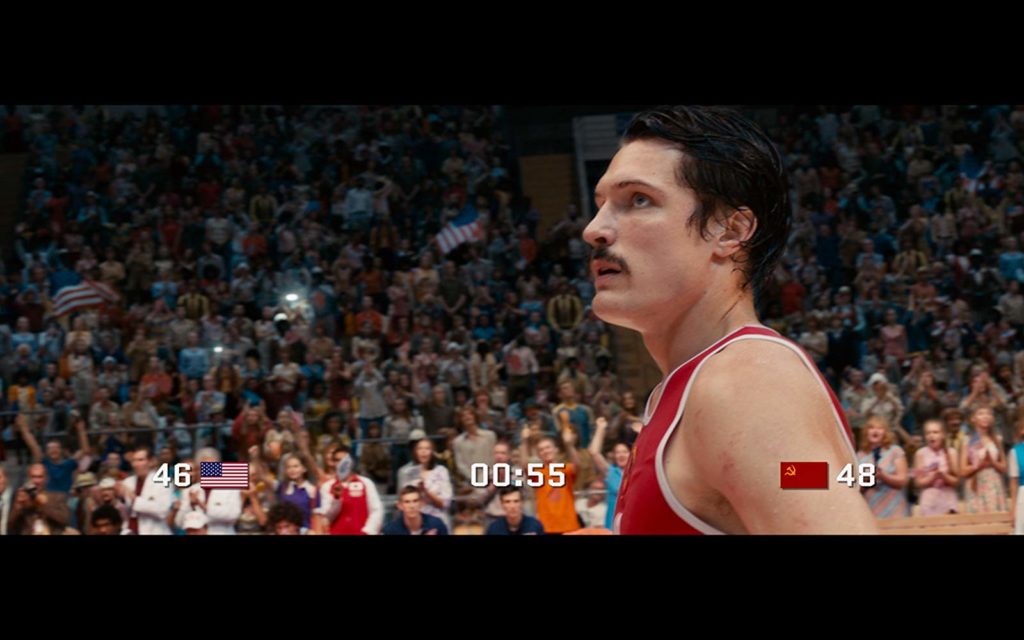Movie of the week: “Three Seconds”
The match that ended three times
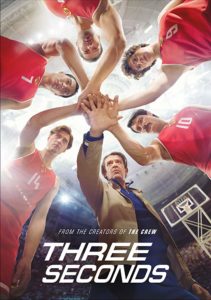 The only good thing about age is that we have the opportunity – not always seized – to witness historical moments. One of these moments that I had the chance to watch on TV was the 1972 Munich Olympics basketball final match. This event, so interesting and unique, was the subject of a beautiful Russian film, “Three Seconds” (RUS, “Dvizhenie vverkh”, 2017), made almost half a century later.
The only good thing about age is that we have the opportunity – not always seized – to witness historical moments. One of these moments that I had the chance to watch on TV was the 1972 Munich Olympics basketball final match. This event, so interesting and unique, was the subject of a beautiful Russian film, “Three Seconds” (RUS, “Dvizhenie vverkh”, 2017), made almost half a century later.
This Olympic games was one of the most tumultuous in history. In the midst of the Cold War, Olympic Games was one of the few opportunities for Soviets to challenge Americans and other Western countries without involving guns and armies.
At the same time, however, many movements of the most different ideologies, including Palestinians, who sought the right to a homeland, practiced kidnappings and heinous attacks. In Munich Olympic Games, the Black September faction invaded Israel housing and made innumerable hostages. For lack of preparation of the German police, the final balance was five terrorists, eleven Israeli athletes and a policeman killed.
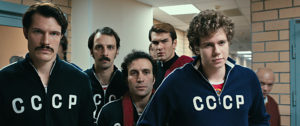 But even if something of that is shown in this film, the main focus was the performance of the Soviet Union basketball team, which although it had many talents and became champion of Europe, could not be compared to any American team. It was with a little experienced group and with fierce regional differences that the coach Vladimir Garanzhin (Vladimir Mashkov) needed to work for the Olympics.
But even if something of that is shown in this film, the main focus was the performance of the Soviet Union basketball team, which although it had many talents and became champion of Europe, could not be compared to any American team. It was with a little experienced group and with fierce regional differences that the coach Vladimir Garanzhin (Vladimir Mashkov) needed to work for the Olympics.
In addition to the difficulties with the team, Garanzhin had his own problems, with a son in need of surgery, and the heavy bureaucracy of the Soviet Union disrupting his plans.
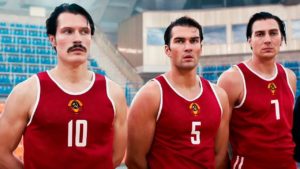 Gradually gaining the confidence of his teammates, the coach manages to build a strong team, but heavily backed by the personal talents of some players, especially Sergey Belov (Kirill Zaytsev. He soon realizes that they will need to go to the source of basketball, in the American territory, to know more about the sport.
Gradually gaining the confidence of his teammates, the coach manages to build a strong team, but heavily backed by the personal talents of some players, especially Sergey Belov (Kirill Zaytsev. He soon realizes that they will need to go to the source of basketball, in the American territory, to know more about the sport.
The construction of the story is interesting, although it has a Russian-style deeply dramatic atmosphere, although it does not disturb the final result of the movie. A good part of the two hours and thirteen minutes of the film is dedicated to building the team and preparing for the Olympics. A better edition could be an improvement.
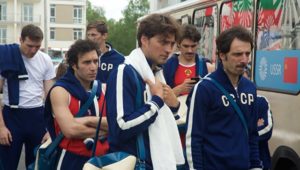 The highlight of the film is really the final match against the American team. At that time, professional athletes could not compete in an Olympics, so all American players came from the college league, which is natural access to the professional league. Even so, the American teams were unbeatable, never losing a match, hence the size of the challenge that the Soviets had to face.
The highlight of the film is really the final match against the American team. At that time, professional athletes could not compete in an Olympics, so all American players came from the college league, which is natural access to the professional league. Even so, the American teams were unbeatable, never losing a match, hence the size of the challenge that the Soviets had to face.
The final match is shown almost in real time, thrilling even those who have never heard of this match. Even more exciting was the final – the finals, in fact – since refereeing errors forced a repeat of the three seconds of the title.
The movie is well made, with a great reconstitution of time, and brings an interesting critical view of the former Soviet Union seen from the optics of today’s Russians. The actors, mostly young people, act very well and gives a lot of life to the movie.
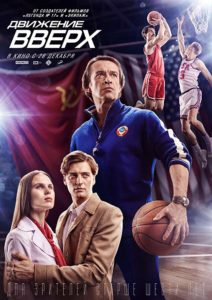 There is a point in the movie that will annoy the Brazilians a little. In showing the Intercontinental Cup of 1972, held in São Paulo, the image is of a city by the sea, and the gigantic Ibirapuera gymnasium was reduced to one condominium court. São Paulo is 80 kilometers away from the sea, and the Ibirapuera Gymnasium comprises more than ten thousand spectators, specially in a Brazil game. The uniform of the Brazilian team had a much darker yellow, and the game with the Soviets is shown like a real pitched battle.
There is a point in the movie that will annoy the Brazilians a little. In showing the Intercontinental Cup of 1972, held in São Paulo, the image is of a city by the sea, and the gigantic Ibirapuera gymnasium was reduced to one condominium court. São Paulo is 80 kilometers away from the sea, and the Ibirapuera Gymnasium comprises more than ten thousand spectators, specially in a Brazil game. The uniform of the Brazilian team had a much darker yellow, and the game with the Soviets is shown like a real pitched battle.
“Three Seconds” is an interesting movie to see, mainly because of the difference of the Hollywood standard to which we are used. More interesting still is knowing a real event with a level of detail rarely shown before. During the display of the final credits are shown the final moments of the real game, with images of the television of that time.
Original title: “Dvizhenie vverkh”

